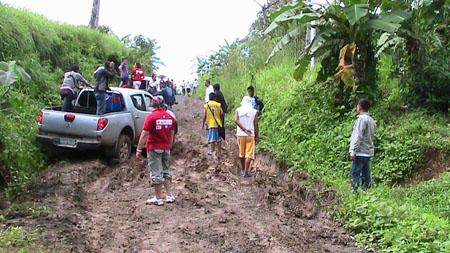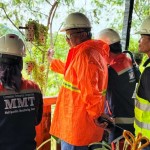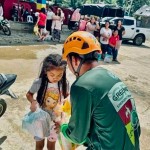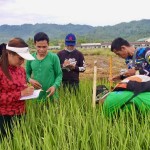TVIRD brings medical mission to town where doctors were unheard of
Among those who eagerly waited for the doctors was the family of Leonardo Catubig, 37, a corn farmer from Barangay Marupay. Leonardo and his wife, Aileen, 32, walked for almost an hour to Tamarok so that they and their four children would be able to see a doctor for the first time in their lives.
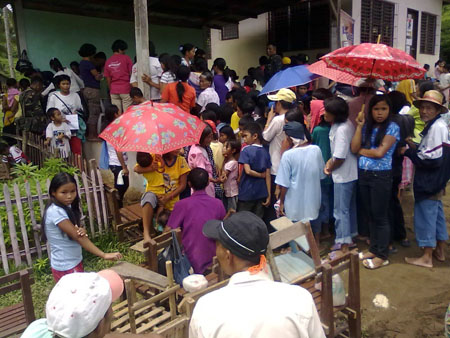
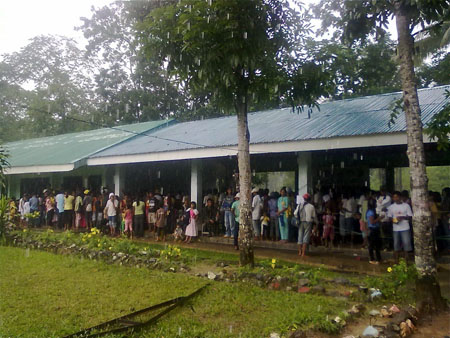
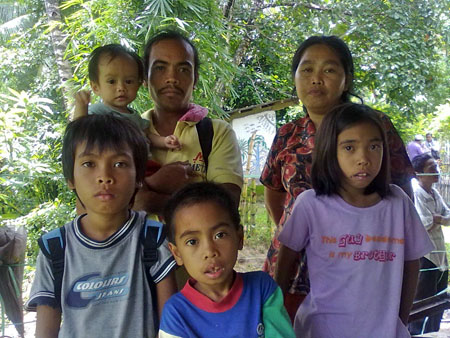
|
Top and middle photos show the long queue of Jose Dalman town residents waiting at the Tamarok Elementary School to receive medical and dental care from a team of volunteer medical missionaries organized by TVIRD. The Catubig family members, in bottom photo, say this was the first time they were able to see get professional treatment from a doctor.
|
“At my age, I have never had the chance to consult a doctor because we are so poor,” Leonardo said. “I am grateful for this opportunity that through this medical mission I am able to have my whole family receive health care that we truly need.”
Aileen narrated that they are hardly able to meet their daily needs and that while they recognize the need for a health check up for their growing children they are unable to provide it. Leonalyn, their eldest daughter, is 11 years old but is still in Grade 2 at Marupay Elementary School. The physician who checked on her suspects that Leonalyn could be suffering from heart problem. The other Catubig children, Reneboy, 10 (also in Grade 2), Jeremy, 8 (Grade 1) and their one year old baby, all received medical attention for fever, cough and colds.
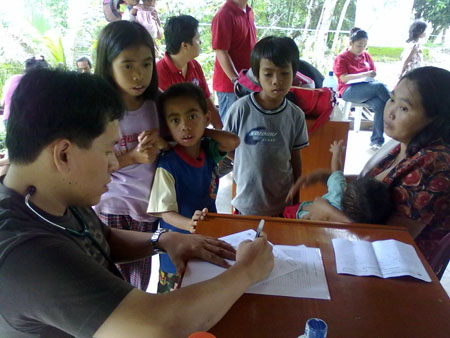
|
Above, the Catubigs consult a doctor for the first time in their lives. Below, patients submit themselves to pre-consultation interview.
|
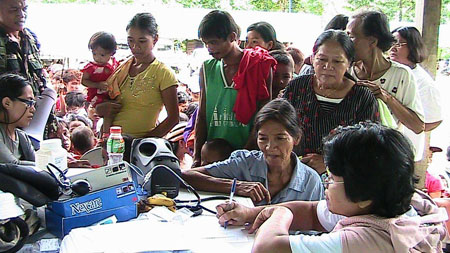
Another beneficiary of the medical mission is the family of Pocito Dumolon, 32, a native of Tamarok. He brought his 8-month old daughter Irish who at the time had fever. “We are thankful to TVIRD for bringing this medical mission to our place. While there is a health center in our barangay, we don’t have a doctor that regularly visits and checks on us. Most of us can’t afford the one hundred peso fare to the Jose Dalman town proper to avail ourselves of the services of government doctors,” said Pocito whose two other children, Elvie, 3, and Misel, 5, were also treated for cough.
Tamarok Barangay Chairman Lorido Temonio and Timuoy Maximo Tigon, the Subano tribal chieftain in the area, expressed their appreciation for this initiative of TVIRD. “I am so happy that our people’s health needs are given due attention with the help of TVIRD. It is a pity that while we know that we are literally standing on rich mineralized soil, our people’s health and welfare are not given priority because of lack of income opportunities,” said Temonio.
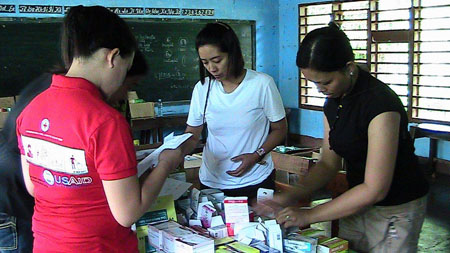
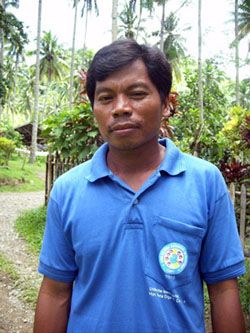
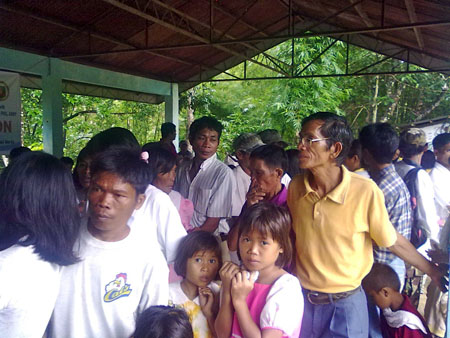
|
TVIRD personnel (top photo) conduct an inventory of free medicines which they distributed to Tamarok village folks. Tamarok Barangay Captain Loredo Temonio (middle photo) and Tamarok Subanon indigenous people chieftain Timuoy Maximo Tigon (bottom photo, in yellow) were quite thankful that their people are being taken care of. “It is a pity that while we know that we are literally standing on rich mineralized soil, our people’s health and welfare are not given priority because of lack of income opportunities,” said Temonio before the coming of the medical mission to their village.
|
The people of Tamarok and neighboring communities derive income only from meager agricultural produce that are barely enough to feed their families. Support from national government such as that for health and infrastructure are inadequate, if not totally unheard of.
Complementing the medical team of TVIRD are volunteer doctors, dentists and nurses from Dipolog City, volunteers from Philippine National Red Cross-Zamboanga del Norte Chapter, and elements of the 101st Brigade of the Philippine Army based in Pinan, Zamboanga del Norte. Aside from free medical consultations, the mission also provided free dental extraction, circumcision, blood typing and health education to the people. TVIRD likewise distributed free medicines to the patients.
Tamarok is one of TVIRD’s prospective expansion areas and further exploration study in the area is being planned. In June 2010, the Barangay Council of Tamarok passed a resolution giving permission to the company to conduct exploration activities in the area.
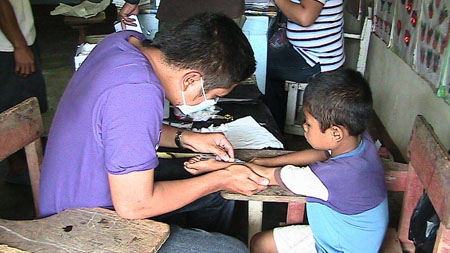
|
Above, a volunteer nurse checks a child for allergies and below, volunteer dentists extract a tooth from a local. The people of Tamarok and neighboring communities derive income only from meager agricultural produce that are barely enough to feed their families. Support from national government such as that for health and infrastructure are inadequate, if not totally unheard of.
|
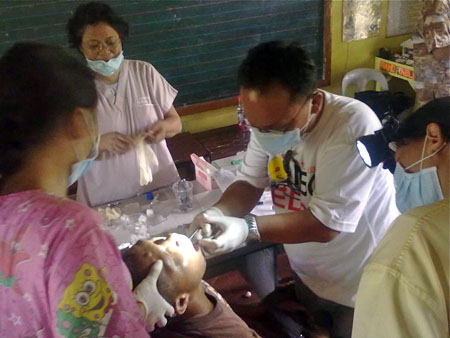
TVIRD believes that responsible exploration and mining practices are key to the sustainable development of hard-to-reach areas such as Tamarok. The company’s social development initiatives at Canatuan in Siocon also in this province have provided residents of TVIRD’s host and impact communities access to such basic services as education, livelihood, health and sanitation, as well as infrastructure that were virtually unheard of in these areas prior before TVIRD began operating in mid-2004. (Ernie Rojo)
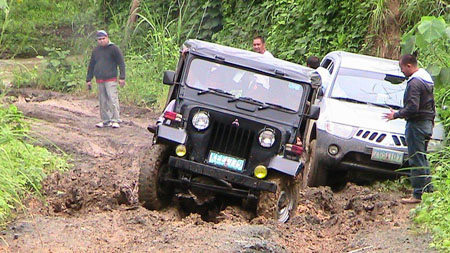
|
Above, a volunteer nurse checks a child for allergies and below, volunteer dentists extract a tooth from a local. The people of Tamarok and neighboring communities derive income only from meager agricultural produce that are barely enough to feed their families. Support from national government such as that for health and infrastructure are inadequate, if not totally unheard of.
|
